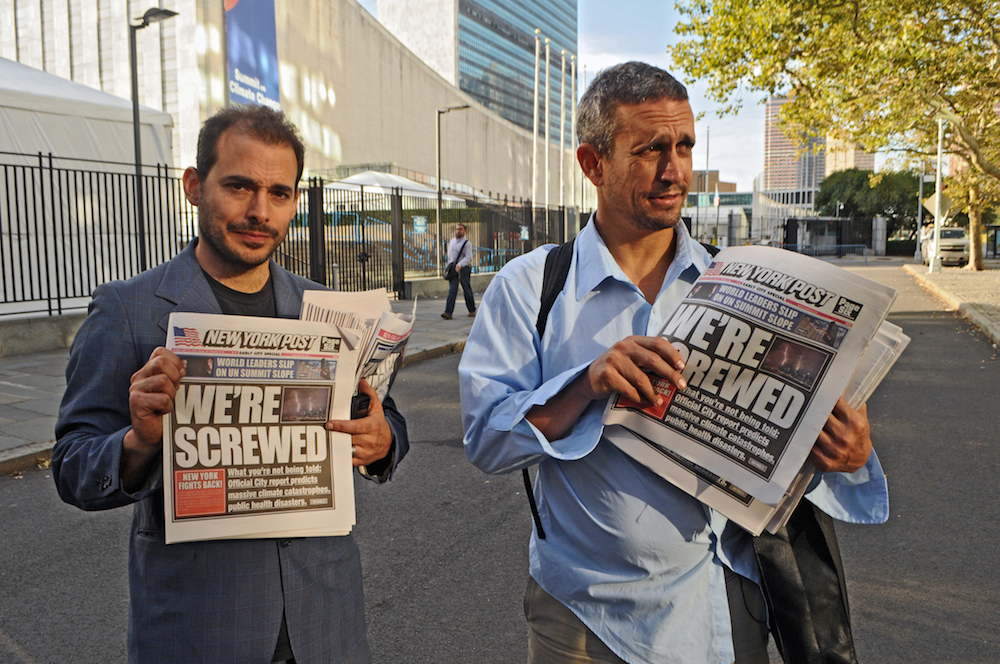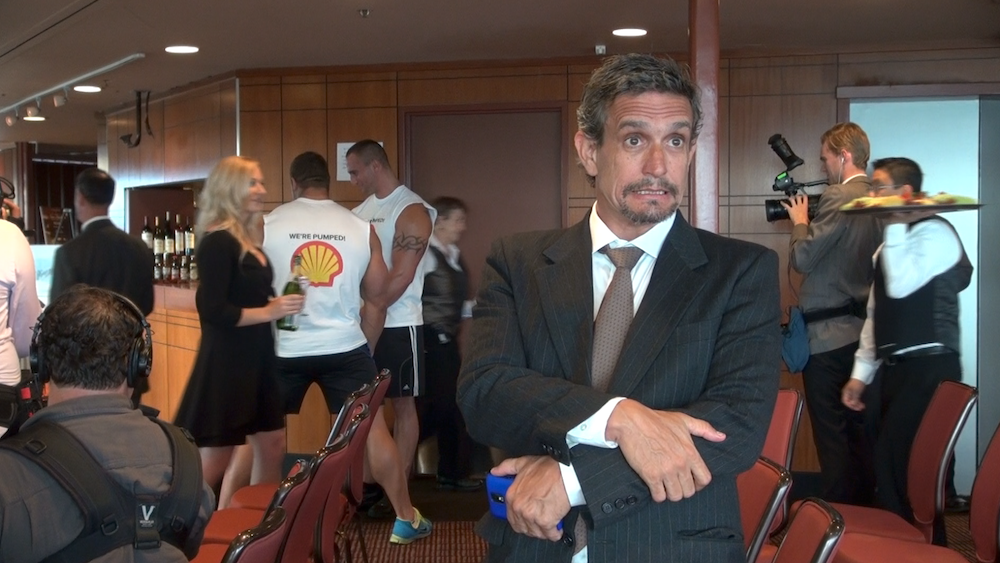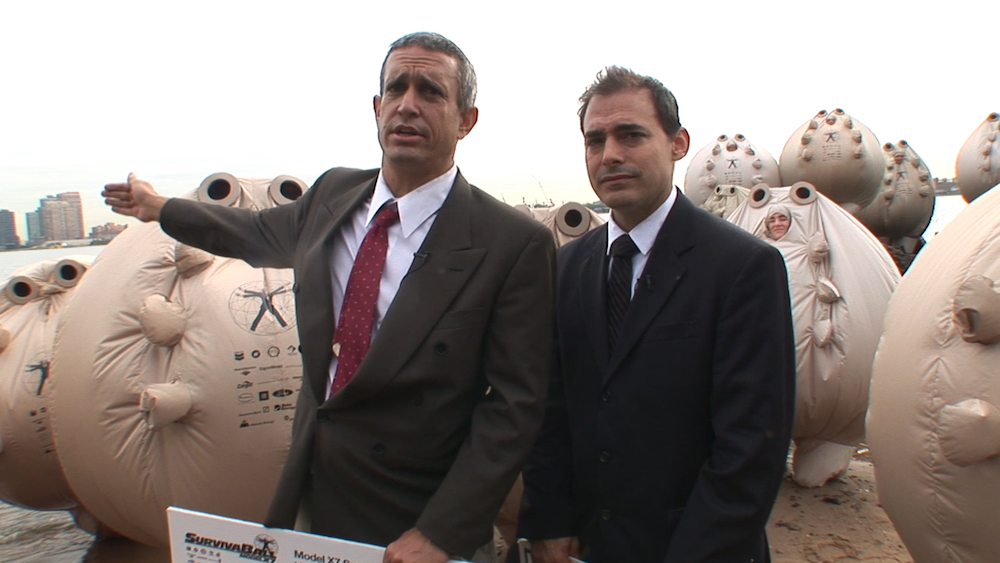The Yes Men — the activist performance team of Jacques Servin and Igor Vamos, who perform under a number of aliases — are on a mission to get people off of the sidelines and into the streets. They’re accomplishing this on multiple fronts.
One: the message. “The Yes Men Are Revolting” is the third and latest film from the Yes Men and Laura Nix, their longtime collaborator and director. It explored the consequences of climate change on the planet and, in parallel, the climate change bearing down on the duo after working together for decades.
Two: the actions. The film was made to inspire viewers to get involved. The Yes Men spent the last two years developing the Action Switchboard, an online clearinghouse of creative actions that allows people to easily get involved and contribute to the completion of those actions with their skills and time. To complement this, Yes Lab launched its first Incubator Workshop, an 8-week class that took over 100 activists through the process of envisioning and executing their own creative actions, soup to nuts.
Writer and activist Andrea Ciannavei spoke to Servin and Nix for Extended Play, focusing her questions on the slippery and captivating relationship people have to power. She learned about the Yes Men’s beginnings — both personal and professional — and the processes by which they stage their elaborate, hilarious hoaxes.
ANDREA CIANNAVEI: I’m actually interested for my own information how you two started working together, how this relationship was formed. Maybe that’s a good way to start and then, and then go from there, you know?
JACQUES SERVIN: Oh, sure! It’s easy to be glib about this and just say the same things again and again. It’s like, wow to actually be personal and Civilians-worthy, that’s a bit intimidating.
ANDREA: Oh, I wouldn’t be intimidated, I mean one example I can give you from my own life, growing up the way that I did, and seeing how people in positions of power — whatever that looks like, whether that’s parental or institutional — abuse their power and are protected in their abusive power. And that dynamic is something that I’m personally obsessed with in my own work, but also as a political being in the world. That’s the thing that really gets me, you know?
JACQUES: Yeah, all right. Oh boy. Let’s see, my father’s a holocaust survivor, and as you see in the film, that was really I think more key than I even quite understand now. But certainly ways in which it’s been key are really obvious. I grew up knowing that that had happened and the basic information about it. Although I think it wasn’t until maybe adolescence that I really kind of got it in its full glory. But all along I had this awareness that power wasn’t good. People with power didn’t know right from wrong just because they had power. I think that was there somewhere in some kind of form always for me. And my dad also, I mean it obviously affected him a tremendous amount.
ANDREA: How so?
JACQUES: Oh, you know. It’s just, a bit of nervousness about things. But one way is he couldn’t stand the thought of me having war toys, for example. I never had any war toys or anything like that, absolutely not. And I never had any desire to have them. I played cowboys and Indians once or twice, but that was the limit of it, and it wasn’t with any special toys. And that was different from everybody else. It was Arizona, it was a very cowboys-and-Indians-centric, weapons-centric place, so I was aware early on there was a big difference between what I was learning and experiencing and what everybody else was. So that was another thing I got, that in some way I’m different. I get everybody’s different, but it was really clear to me how I was different. And my dad also was explicit about it. We got our first TV when I was six… And then I got kind of absorbed in it and watched a couple of shows a lot, and there was one moment when I got REALLY into it. And nothing about it bothered me, but my dad at one point — I was just reacting in a “normal” way to TV, and telling him about a commercial I’d seen. And this cool product — whatever it was, I don’t remember the content — but he just said, “You know, that’s all lies. The commercials, there’s nothing to that. They just want to sell you stuff, that’s why they play them.” I think he was especially attuned to that, the power of propaganda. This was a particular American form, and after that he just completely ruined me. I just stopped watching it… I still just, even really good shows… They make me crazy. I just can’t, like I don’t have the gene for this—
ANDREA: Hypnotism?
JACQUES: Hypnotism. Yeah, I don’t get hypnotized. So that predisposed me to be a kind of a trickster. I fuck with people’s perceptions, and want to mess with the way power expresses itself in the world.

Mike Bonanno and Andy Bichlbaum (aliases of Igor Vamos and Jacques Servin , respectively) holding copies of a fake edition of the New York Post. Photo Credit: Genevieve Jacobson.
ANDREA: When you talk about power, one of the things I notice in myself is that my relationship with powerful people is very strange. On the one hand, I have this desire to please, and then right behind it is, I want to tear it down. I make the mistake of endowing power with other attributes that don’t belong to it. Someone who’s powerful in my mind automatically becomes better, they become more moral, they become somehow a superior person, when really all they have is power.
JACQUES: I know, it’s pretty disturbing to observe that in oneself. I have the exact identical experience… It’s creepy.
ANDREA: Right. And how do you undo that? How do you catch yourself in the middle of the act and then reverse course? When I watch your actions, putting yourself out there in the films and stuff — that’s a certain level of bravery. How do you talk yourself away from closing up? It’s scary to get in front of the actual people and confront them with humor and creativity.
JACQUES: I think you hit it on the head when you said you have one of two reactions. Either you want to tear it down, tear them down, or you wanna cozy up to them and get their favor. And in those positions, the choice is very clear. We’re there at one of these conferences, for example, to tear these people down and to tear down whatever we’re doing… In our minds, when we go in there, I think we’re not seeing them as powerful people. We’re seeing them as people to be fucked with.
ANDREA: Can you talk about how you met Mike Bonanno (alias of Yes Men cofounder Igor Vamos) and how you guys came up with the idea to form the Yes Men?
JACQUES: Sure, well after I suddenly became a media celebrity because of this thing I’d done… I was a video game programmer at a games company, and they assigned me to work on SimCopter, and I was in charge of the little people running around in the game. My boyfriend broke up with me, and I was despondent. I wanted time off, they wouldn’t give me time off… and so I put a little feature into the game, where the little people would occasionally turn into boys in swimsuits, and they would just madly kiss each other. As a consequence, the 80,000 copies that shipped to store shelves had this feature in it, and my boss discovered it the next morning while he was playing the game with his nine-year-old daughter… So they fired me after a week, and I was telling a couple reporter friends about it, and one of them said, “That’s an amazing story and I’m going to write about it.” That was Steve Silberman at Wired, and he published this great article about it, which then took off and was in the AP and all over the place. I was thrilled, it was all over the TV, too, and I really enjoyed it… I had to learn how to take an opportunity or quest to really spin it into answers that I wanted to give. And I was kind of coached on that at the time by some activists in New York who I hooked up with, and they gave me pointers on how to talk about these things and how I had to be an activist, and I really enjoyed that, too. It was in San Francisco that I had all of this happen, and it was in the middle of the AIDS crisis, so Act Up was a big phenomenon, and Act Up was really powerful, and they did a lot of crazy things to get media attention. It was all about media attention, so I think by the time I did this, I was inured to the idea that you do things for media attention, that you can use any opportunity to get media attention. They did really clever things, too, funny things. I think I was using that idea through Act Up, and when it happened, I was ready. I didn’t mean to make this happen, but… we had it to turn it from this peevish, weird thing that I did as a disgruntled employee into an act of gay activism. And we did! But then I also thought, “Maybe if I’d done this on purpose, I could do more with it.” Also I’m a fiction writer, so after the media attention died down, I thought one way to perpetuate it would be to write a piece of fiction, but pass it off as real… And I mean, people kind of believed it, kind of not, but what did come out of this was, a couple of friends said I should look up this guy who had done this Barbie liberation and would really get this sort of fiction and wanna work on it. And in fact, that’s what happened.

Andy Bichlbaum (alias of Jacques Servin) at a Shell Corporation party in “The Yes Men Are Revolting.” Photo Credit: Genevieve Jacobson.
ANDREA: It seems like whole industries use the same tactics to convince people that their agenda is the right thing or their product is the right thing — to sell people on certain things. It almost seems like you’re taking it and turning it back on them.
JACQUES: Totally. Most of what we do now — what we’ve been doing for maybe sixteen years since the Yes Men — is we make a point of revealing the hoax very quickly and not perpetuating the lie.
ANDREA: And so how did you come to meet Laura and start working with her?
JACQUES: We actually met, I think back in 1999 or 2000.
LAURA NIX: ’98.
JACQUES: ’98, and correct me if I’m wrong… But there was this other group, Etoy, which was very similar, in that they pretended to be this really big, important organization with financialization and all kinds of stock apparatuses and boards of directors, and they were just, I think, six Swiss and Austrian kids, dressing in orange. And I couldn’t really see what their political point was, but they were really good and slick and convincing. They were like us, except without the politics, as far as I could see. But their name is Etoy, and at one point during the dot-com boom, when everything was valuable online, there was a toy company called eToys. They actually sued this other Etoy dot com, which had nothing to do with toys, and they’d never thought of the word “toy” being part of their name. I think it was just a random hodge-podge of letters. I don’t even know how they came up with it, but it had nothing to do with toys, and they sued them for their domain name. And so we got involved in that whole thing, and Laura went to the toy company and interviewed people, pretending to be a reporter.
ANDREA: Laura, how did you start off, and what drew you to it?
LAURA: I grew up in a white middle class suburb and was living a pretty privileged existence in that white middle class suburb. But I think I, from a pretty early age, was pretty struck by how much conformity is expected in that environment, and I felt this pushing against that. I just had some teenage adolescent rage and angst, and I didn’t like the amount of conformity that was expected, particularly for women, because I went to high school in the early 80s, and it was a different time than it is now. There’s this limited bandwidth of behavior that women are allowed to exist in and express, and from a really young age, I was against that and angry about that and pushing that… When I got to college, I became more politically active, and I joined different groups, and I was friends with people who were chaining themselves to buildings to protest apartheid. I was doing more journalism stuff, so I was writing about that and in support of those actions and having tons of arguments with people about why we need to support this kind of activism. And it wasn’t until really after college that I started getting involved in activism directly myself, when I graduated and was hanging out in Portland, Oregon. I got involved with Act Up Portland, and started doing stuff with them there. When I moved to the East Coast after that, I was going to Act Up meetings in New York when I could. I was living in Boston, and I got involved with Queer Nation in Boston and did a bunch of stuff with them… I was with a group of queer Irish-Americans who first marched in the St. Patrick’s Day Parade in Boston, and we had to have a police escort and security teams. We were being attacked with beer bottles and people throwing tires and all these kinds of things, and there were getaway cars in case it got too violent. And, in fact, they did have to pull us out, because it got so out of control and violent. Afterwards we went to a liberal church and sat and held each other and sobbed, covered in beer. And you know, those moments are things that I think were, I dunno, formative—
ANDREA: I’m sorry to interrupt. I would imagine after the trauma of that — what do you tell yourself that gives you the ability to go back and do it again? I understand the adrenaline part. But most people can’t even deal with being yelled at, so to be physically assaulted in that way? How do you talk yourself into putting yourself into that position again?
LAURA: I mean, I was just fueled by outrage and by a sense of, you know, “Who are these people yelling at me?” It’s such a different time now. It’s so hard to remember, but when you did any kind of queer protest the early 90s, which is when I was doing that, you were always confronted with violence. Every single protest you went to, you were being yelled at and called names and screamed at, and it was really intense. People had no fear of saying anything to you, and it was just constant. Whether that was going to picket anti-abortion people at reproductive centers, or whether that was at a Queer Nation protest, or an Act Up protest, that kind of stuff was very, very, very, very in your face… After you’re confronted with that, I think it just gives you more reason to go back, rather than the opposite. It bolsters you, I think it gives you courage to` keep going, rather than the other way around. That said, I’m not an Egyptian or a Syrian who could be thrown away in jail for the rest of my life, and so I say that as a white person in America. I think it’s very different for people of color to be in that kind of protest. I think it’s very different for people in other countries to be doing that kind of protest.
ANDREA: Right, right. And so you guys first met in ’98 through you posing as a journalist interviewing the people at the toy company?
LAURA: That’s the first time that I met Jacques, was when he was hanging around in San Diego with Igor, but I went to Reed College in Portland, Oregon, with Igor, and then, later on, we also went to graduate school together. We were in the visual arts department at U.C. San Diego. But yeah, the Yes Men enlisted me in that action, and it was really fun to take on another persona. It challenges you in different ways, and it was great to watch how easily people believe you when you tell them who you are. After having worked with them for this length of time, I still get super nervous, I still think that things will go wrong. But you know, it all somehow just turns out okay.
ANDREA: When you’re doing your own projects, is the hierarchy horizontal or vertical? When you’re identifying who you’re going to go after and how you’re going to go after them, how does that work?
JACQUES: When Igor and I work together on things, there’s no democracy needed if you’re two people. We just figure it out, and argue, and call each other on it. And it’s not as good when there’s just one of us… So I wouldn’t say that’s horizontal or hierarchical, it’s just two people arguing and figuring it out. When we do things in a group, I prefer it to be as horizontal as possible, but that’s really inefficient… It’s really important to have leaders, and to, yeah, do things with this kind of work. Just do it. Yeah.
ANDREA: Once you start becoming a person that people look to, how do you navigate that kind of power, you know?
JACQUES: With difficulty… Yeah, it’s tricky. It’s really valuable to have people that you trust to challenge you, and to put the brakes on, and that’s really hard to develop.
ANDREA: You’d have to have a level of deep trust, because when people start challenging you on things, I’d guess your initial response would be to defend your position and maintain power.
JACQUES: And that can be valuable, too. To really fight for your position is better than to just say, “Okay, I guess you know better.” That’s as bad as being allowed to just run forward. Defending your position can be a good part of the process.

Andy Bichlbaum and Mike Bonanno (aliases of Jacques Servin and Igor Vamos, respectively) in “The Yes Men Are Revolting.” Photo Credit: Genevieve Jacobson.
ANDREA: What do you guys have planned next?
JACQUES: I was just in Greenland with Greenpeace, doing a couple of actions and working with them on a video involving some movie stars. A whole new kind of thing. And we’re talking about going up next year and doing more on that, without the movie stars. Campaign stuff around the Arctic. We’re also thinking about Paris and some ideas around there. And there’s another project that’s just come up with some people in Maryland. There’s little projects that keep coming up, but we’re not making a movie. Maybe a web series, or that sort of thing — we’ve got a lot of stuff ready for that, but we’ll see. In three years, we’ll be able to say what we were doing now. We don’t know right now.
ANDREA: It seems like a lot of your work is geared towards climate change.
JACQUES: That’s because that’s where the movement is right now, that’s where energy is. It seems like an ultimate issue, it’s a focus for a lot of things, there’s a lot of energy around it… It seems like when there’s millions of people all focused on achieving a goal, they succeed. And so there’s a lot of reasons to hope now that even with the horrible, immense problem with climate change, we can win.
ANDREA: You’re remarkably optimistic. Sometimes I feel like it’s so easy to fall into, “It’s hopeless, no one gives a shit, nothing’s gonna happen, nothing’s gonna change.” But then, as Laura was talking about with Act Up — I was in college in the early 90s, and I remember the urgency of it. Things are markedly different today than they were then. But when you’re in the middle of it, it’s hard to see that the arc is bending towards justice.
JACQUES: Without the picture of it, it’s really hard to see it, but I think we have to realize that. I think the Civil Rights activists and strategists and people like Martin Luther King recognized that. They had to recognize that, because it seemed really hopeless and impossible and like it wasn’t going anywhere. There was no reason to think that we’d have the society we have today, which is significantly better. At the time, there was no evidence for that. But over the span of ten years, they achieved a lot. We look back now and think of it as one moment, but it was a long, long, long series of moments.
ANDREA: It seems to me like you guys started working together, perfecting a process that’s sort of very open and collaborative. And the way you’ve been talking about the next phase is that you want to activate people to take your template and rejigger it so that it fits them. How do you get people to wake up and join the party?
JACQUES: Good question. With this movie, the theory was that it would be the personal story that would help answer some basic questions like, “Why bother to do activism in the first place?” Seeing us answer that question for ourselves, we thought that would help people over the barrier a little bit.
LAURA: But I think, in general, it’s humor. That’s what the secret weapon is with the Yes Men. They’re using humor to get people to think and talk about political issues that they’re not interested in thinking about. It’s the Trojan horse. It’s the way you get in.
Post Views:
1,905




